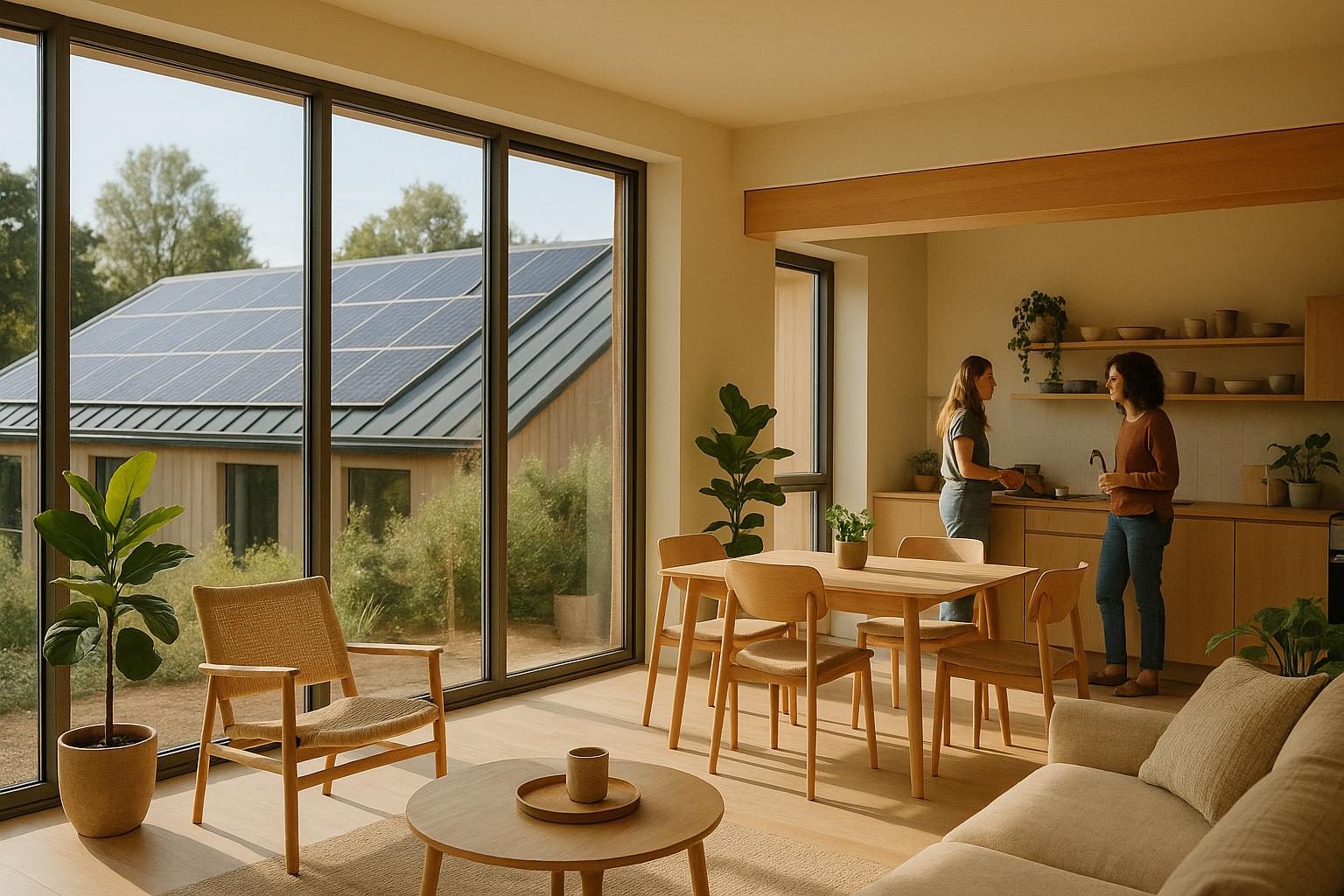Networking in coliving spaces is all about connecting with like-minded professionals in a shared living environment. These spaces combine private rooms with shared areas like coworking spaces, kitchens, and lounges, designed to encourage interactions. Here’s why they’re great for building connections:
- Daily interactions: Casual conversations in shared spaces often lead to meaningful relationships.
- Community events: Activities like workshops, dinners, or book clubs make meeting others easy.
- Global reach: Platforms like Coliving.com help you find spaces in 350+ cities, enabling international networking.
- Collaborative environment: Shared workspaces and group projects encourage skill-sharing and partnerships.
Key takeaway: Coliving spaces naturally integrate living and networking, offering professionals a supportive setting to grow connections effortlessly.
Why Coliving Spaces Work Well for Networking
Coliving spaces offer a fresh approach to networking, creating opportunities that are often missing in traditional housing setups. These spaces are intentionally designed to turn everyday moments into meaningful professional connections.
What Sets Coliving Spaces Apart for Networking?
The design of coliving spaces actively encourages interaction. Unlike typical apartment complexes - where neighbors might barely exchange a nod - these spaces are built to foster connections. Communal areas like coworking spaces, kitchens, and lounges are thoughtfully placed to create natural gathering spots throughout the day.
In a coliving setup, you get a mix of private living quarters and shared spaces like kitchens, lounges, and work areas. This balance allows you to maintain your personal space while still having plenty of chances to meet and engage with others. With amenities like utilities, cleaning services, and Wi-Fi already taken care of, you can focus more on building connections and less on household chores.
Adding to the appeal, many coliving spaces are situated in dynamic business hubs or creative neighborhoods. These locations naturally attract people with shared professional interests, making it easier to connect with individuals who understand your industry and career aspirations.
How Community Living Fuels Professional Growth
The intentional layout of coliving spaces doesn't just encourage casual chats - it creates fertile ground for professional growth. Living among people from diverse fields sparks opportunities for knowledge sharing and skill-building. You might find yourself swapping ideas with a designer over breakfast, brainstorming with a marketing expert in the lounge, or learning about new trends from someone in a completely different industry.
For remote workers and digital nomads, the coworking areas in coliving spaces offer a structured environment for both productivity and interaction. Community events and social gatherings further strengthen the sense of belonging while opening doors to job leads, mentorship, and valuable advice.
This kind of supportive community nurtures both personal well-being and professional relationships. When you feel at ease and connected, networking becomes a natural extension of daily life. These diverse communities provide the perfect backdrop for building meaningful, long-lasting professional connections.
How to Network Effectively in Coliving Spaces
Living in a coliving space opens up countless opportunities to turn everyday interactions into meaningful connections. Unlike traditional networking events, coliving naturally blends socializing with daily life. The trick? Be intentional while staying genuine in how you engage with others.
Join Shared Activities and Events
Coliving spaces often host events that make meeting people feel easy and natural. Think communal dinners, movie nights, or outdoor adventures - these activities create a relaxed atmosphere where conversations flow without the stiffness of formal networking.
Cooking classes, for instance, are fantastic for connecting with others. Whether you're rolling out pasta dough or trying a new recipe, it's easy to strike up conversations. Who knows? The person next to you might share your professional interests or have skills that align with your goals.
Book clubs are another excellent way to meet like-minded individuals. Regular discussions around shared reading create opportunities to bond over ideas and opinions. Similarly, wellness retreats or friendly sports competitions organized by coliving spaces provide a chance to meet people who share your interests, making it easier to find common ground.
Use Coworking and Collaboration Opportunities
Many coliving spaces include coworking areas, which are perfect for professional networking. These shared workspaces encourage collaboration and idea-sharing. When you're stuck on a problem, the person sitting nearby might have just the expertise you need. Casual chats can lead to brainstorming sessions or even new projects.
Coworking spaces also help foster accountability partnerships. For example, coordinating your work schedule with another remote worker could lead to regular coffee breaks where you exchange advice or share industry insights. Beyond the desks, outdoor spaces - whether used for barbecues, yoga, or just lounging - extend networking opportunities into more casual settings. These moments often pave the way for deeper conversations and mutual trust.
Start Conversations and Stay Approachable
While shared spaces set the stage, it's personal engagement that strengthens connections. Networking in coliving spaces often starts with a simple conversation. A compliment, a question about a local spot, or a comment on something in the shared space - like, "That looks like an interesting book! What’s it about?" - can turn a casual moment into a meaningful interaction.
Listening actively is key to making these chats count. Show you're engaged by maintaining eye contact, nodding, and offering thoughtful responses. Ask open-ended questions to encourage more detailed answers, and avoid interrupting. Referencing details from past conversations also shows you value the relationship and helps build rapport over time.
Keeping Relationships Strong After Moving Out
The bonds formed during coliving can often become lasting professional connections. The secret lies in being intentional about maintaining those relationships and finding ways to keep adding value to each other's lives. With a little effort, your coliving experience can serve as the foundation for a network that supports you well into the future.
Follow Up and Stay in Touch
Staying in touch goes beyond simply adding someone on LinkedIn and hoping for the best. A better approach? Send personalized messages that reference shared experiences or projects. This shows thoughtfulness and keeps the connection meaningful.
LinkedIn is a powerful tool for keeping your professional network alive. Share updates about your career, celebrate milestones, and engage with posts from your former housemates. If someone you lived with gets a promotion or starts a new venture, take a moment to send a thoughtful comment or direct message congratulating them.
"Every interaction needs to be modified to accommodate that particular person - everyone communicates differently! Some individuals just want facts, while others are more conversational. The key is flexibility: don't go into a conversation with a pre-determined dialogue, but have a set strategy of what you hope to learn in the interaction." - Matthew Small, Customer Experience Specialist
Use multiple communication channels to stay connected. While some people might prefer a quick Slack message, others may appreciate a professional email. Personal CRM tools like Clay or Covve can help you remember important dates, interests, or shared milestones, making your outreach more personal.
Regular check-ins are most effective when they’re genuine and helpful. Share an article that’s relevant to their industry, connect them with someone in your network, or pass along insights from your own experiences. This "help first, ask later" approach builds trust and keeps the relationship strong over time.
Work Together on Projects or Initiatives
While staying in touch online is important, nothing strengthens a relationship like working together on a project. The professional skills and expertise you discovered in your housemates don’t disappear when you move away - they can be the starting point for exciting new collaborations.
Collaborative projects are a fantastic way to maintain these bonds. Tools like Trello, Monday.com, or ClickUp make it easy to manage projects remotely. Start small - co-author a blog post, team up on a freelance project, or brainstorm ideas during alumni events. These interactions can reignite the camaraderie you built during coliving while creating something meaningful.
For those in digital nomad or remote work communities, these collaborations often come naturally. Your coliving experience can serve as a launchpad for a global network that continues to grow, even as you move to new places.
Respect every connection and keep the lines of communication open. Some relationships might evolve into business partnerships, while others could provide valuable advice, referrals, or industry insights. Both types are worth nurturing, as you never know when a casual contact might lead to your next big opportunity or introduce you to someone who will.
Conclusion: Making the Most of Coliving Networks
Coliving networks have the unique ability to turn everyday interactions into meaningful, career-shaping connections. By blending shared experiences with collaboration, they create an environment where professional growth happens organically.
The secret to thriving in these spaces? Consistency and intentionality. Whether it’s bonding over a communal meal or teaming up on a coworking project, every shared moment strengthens your professional network. The diverse community - ranging from remote workers to entrepreneurs and digital nomads - offers a melting pot of ideas and opportunities you’d rarely encounter in a traditional office.
Industry leaders recognize this dynamic.
"Coliving for remote workers is more than just a housing option; it's a lifestyle choice that promotes connectivity, creativity, and flexibility." - Or Goldschmidt, CEO of Roomrs
What sets coliving apart is its global reach and long-term impact. The connections you make don’t stop when your lease ends. Instead, they naturally evolve into enduring professional relationships that grow alongside your career. These bonds don’t demand constant upkeep but remain valuable as you transition from one stage of your journey to the next.
If you’re ready to tap into these benefits, platforms like Coliving.com can help you find the perfect community for your needs. With tools to filter spaces based on your professional lifestyle - whether you’re a digital nomad, a startup founder, or a remote corporate worker - Coliving.com connects you to a vast network of communities worldwide. The platform’s 14,000+ reviews, averaging 4.9/5, provide a clear picture of the opportunities each space offers for networking and growth.
The value of coliving goes far beyond the potential savings of 40%. It’s an investment in a network that grows with you, offering support, opportunities, and friendships that can last a lifetime. Explore your options today, and you might just find that the right coliving space is the springboard for your next big career move.
FAQs
How can I successfully network in a coliving space as an introvert?
Networking as an introvert in a coliving space might feel daunting at first, but it’s entirely manageable with a few thoughtful approaches. Start by setting small, realistic goals, such as introducing yourself to one or two people each week. This way, you can ease into the social environment without feeling overwhelmed.
Instead of diving into group settings, focus on one-on-one conversations. These often feel more personal and less intimidating, giving you the chance to build deeper connections. To make things easier, have a few conversation starters ready - questions about work, hobbies, or even the coliving experience can be great icebreakers.
Most coliving spaces host events or communal activities. Pick the ones that feel most comfortable for you and use them as opportunities to meet others in a relaxed setting. If in-person interactions feel like too much, explore the community’s online tools or social groups. Engaging digitally lets you connect at your own pace, making it easier to build relationships over time.
By taking small steps and finding what works best for your personality, you can create meaningful connections and fully enjoy your coliving experience.
How can I stay connected with the professional contacts I made in a coliving space after moving out?
Staying in touch with professional contacts you’ve made in coliving spaces boils down to regular communication and building a mutually beneficial relationship. Make it a habit to check in through messages, calls, or emails, and stay connected on platforms like LinkedIn to keep up with their latest endeavors and accomplishments.
Show authentic interest by celebrating their successes, sharing useful resources, or teaming up on projects whenever the chance presents itself. Even small acts, like congratulating them on a new role or offering a helping hand, can strengthen the relationship and keep it meaningful over time.
What makes coliving spaces unique for networking compared to coworking spaces?
Coliving spaces offer a unique environment where living, socializing, and working seamlessly come together. By sharing daily routines and participating in community-driven activities, residents naturally build deeper, more personal connections that go beyond surface-level interactions.
On the other hand, coworking spaces are geared toward professional networking. They provide opportunities like networking events and work-focused connections, prioritizing career development. While coworking spaces center on professional growth, coliving spaces take it a step further by blending professional opportunities with meaningful personal relationships, creating a more well-rounded experience.






